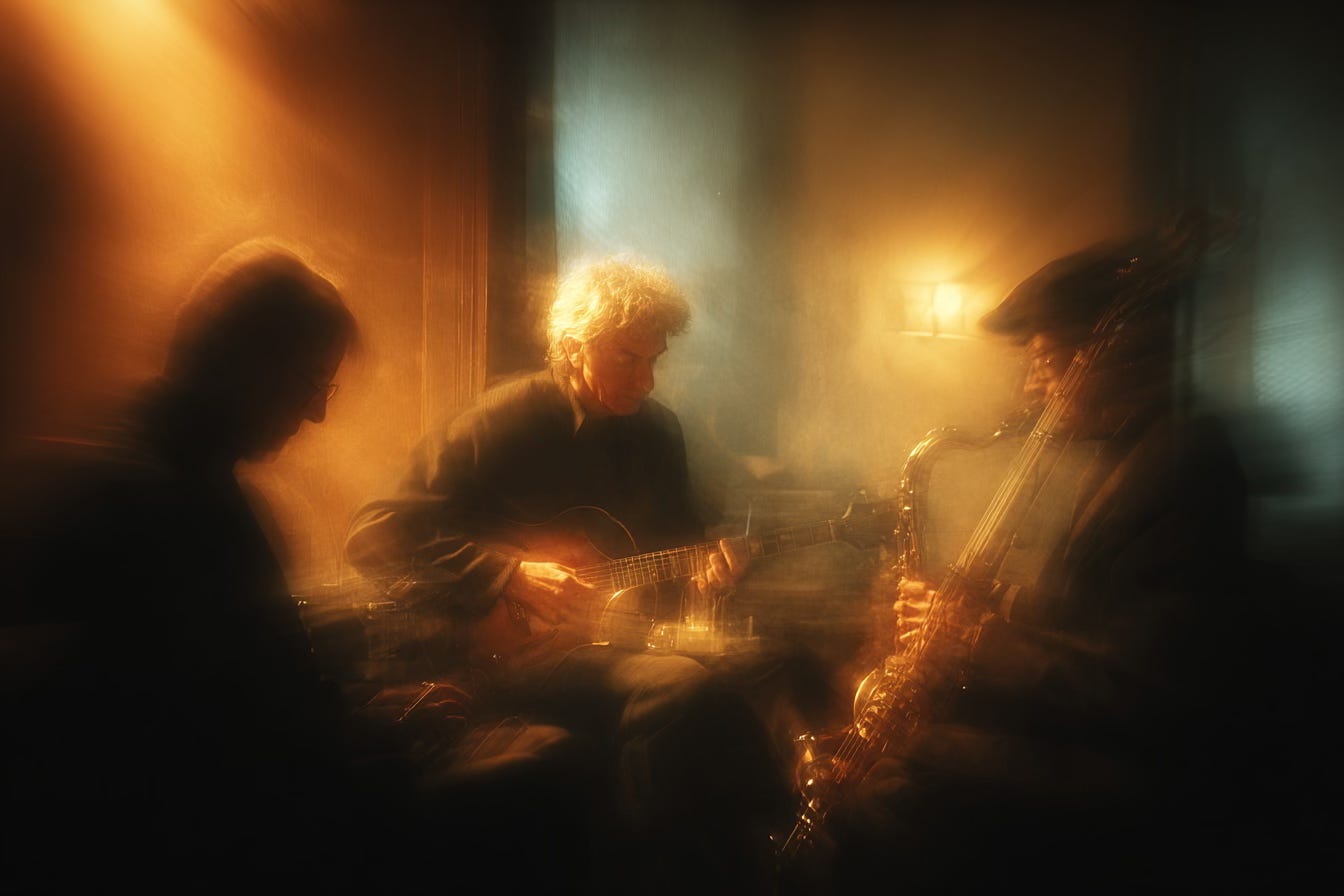Jazz, Shame, and Being With: A Reader's Guide
A 20-essay series tracing shame and pride from neurobiology through theology to political formation—and the incarnational alternative
A Long Arc on How We Become Ourselves in the Presence of Others
Why does wounded pride seek dominance?
Because I’ve watched it happen. Christians who turn the cross into a weapon. People who think faithfulness means destroying their enemies. Theologies that make people smaller, meaner, more afraid. The spiritual formation of resentment into national identity.
This isn’t just about individual psychology. It’s about how shame and pride operate at fundamentally different levels—shame as pre-cognitive affect firing in the brainstem, pride as relational emotion developing over years—and what happens when theological systems misunderstand this asymmetry. When achievement-based formation creates oscillation between shame and defensive inflation. When wounded pride scales from persons to congregations to movements to nations.
This 20-essay series traces that pattern from its neurobiological roots through its theological genealogy to its political manifestations. Where it comes from. How it works. What alternatives exist.
Three concepts organize everything:
Jazz — Disciplined interdependence made audible. You can’t play it alone. You have to listen, risk, fail, recover—all while staying present to what’s emerging. Communion made sonic.
Shame — The nervous system’s bid for reconnection. What fires before thought when the bond is threatened. Not moral failure but biological signal calling us back to communion.
Being With — Samuel Wells’ term for incarnational presence. The posture that refuses to fix, solve, correct, or control. What God does in Christ. What healed communities practice instead of performance.
Where this goes: Christian nationalism as wounded pride seeking enemies. Dominative Christianism in both its MAGA and Providential Identitarian forms. And Beloved Community—not as slogan but as embodied practice rooted in MLK, Cone, Wells, and Bretherton—as the alternative.
The Series
This series builds cumulatively—later essays assume concepts and frameworks from earlier ones—but start anywhere that calls to you.
If your life feels louder than you can manage, this first essay listens for the rhythm beneath the noise. What begins in a hospital tunnel opens into a theology of presence: the strange way grace keeps time with us even when control is gone. This is where the series learns to hear the music already playing.
If you’ve ever wondered why your mind keeps producing threats you can’t outthink, this essay names the three “factories” running in all of us. Biology, imagination, and trauma all generate realities we can’t dominate—but they can be lived with. Here the series discovers patience as the tempo of love, and Being With as the only antidote to domination.
In a world that feels split into rival realities, this essay argues a startling claim: we can still know truth together because we share one world. From radiation oncology to the Areopagus, it traces how charitable attention restores the possibility of hope. This is the essay where epistemology becomes pastoral care for a fragmented age.
If shame has ever felt like a verdict, this essay reframes it as a gift—creation’s built-in signal that communion matters. It moves from the Wegmans parking lot to Genesis, showing how the body remembers what the mind forgets. Here the series finds its theological center: shame not as contamination, but as invitation.
If you were raised to be useful before being known, this essay tells the truth about performance as a first religion. Tracing a line from Southern piety to J. Kameron Carter’s (@religionotherwise) Easter grammar, it shows how identity must be received before it can be offered. This is the hinge between receiving and contributing—the beginning of ordered pride.
If you’ve ever wondered why decades of achievement never quieted the shame beneath them, this essay names the missing piece: shame fires at the firmware level, pride forms only when the body feels safe again. Here the series shows how grace widens the window where agency becomes truthful—why pride can finally become offering rather than armor.
If you’ve ever suspected your formation distorted the tradition rather than transmitted it, this essay finds companions in Augustine, the Cappadocians, and Aquinas. Beginning with a phone call confessing love for a Catholic saint, it discovers what I was never taught: pride isn’t the problem. Disordered pride is. Here the series finds the grammar for contributing from secure belonging—magnanimity paired with humility, courage rooted in reception.
If the main essay’s claims felt true but ungrounded—if “being is gift” and “scarcity is lie” sounded right but you wanted to see the load-bearing structure—this appendix shows the work. It moves from classical theism through affect neuroscience to Samuel Wells’s incarnational theology, naming why manna economics is metaphysically serious and transactional atonement smuggles Pharaoh into the doctrine of God. Here the series lays its philosophical foundations bare.
If your body still tightens around money even when you have enough—if Christmas feels spiritually thin and you can't name why—this essay traces two ancient economies still competing for your nervous system. Moving from the jar in the Ark to Mary's reversals to Emmaus bread, it shows why the faith that sings the Magnificat so readily blesses extraction. Here the series finds its economic grammar: the only manna that keeps is the manna released.
If you’ve ever sensed that Christian language no longer produces Christian lives, this essay names why. It traces how Stoic self-sufficiency and Gnostic abstraction quietly reshaped Christian formation, teaching us to sound faithful while being trained in domination and control. Here the series turns genealogical, showing how a distorted grammar of self-construction took root—and why practices of Being With once held it at bay.
This riff pauses the main arc to ask an epistemic question the series depends on: who becomes visible when we look, and who disappears when we don’t. It explores how systems of evidence can remain rigorously blind to the suffering they exclude, preparing the ground for the genealogical work that follows in Essay 9.
For moments when fury feels justified but corrosive, this riff slows the pace.
A pastoral pause within the Jazz, Shame, and Being With arc, practicing kindness, regulation, and small embodied rituals as ways of staying human.
For moments when outrage clouds judgment and despair narrows imagination, this riff slows the tempo.
It reflects on music, presence, and the practices that help us stay human—and act faithfully—amid state violence and moral overload.
If you’ve ever wondered how a faith centered on a Jewish rabbi from Galilee could come to bless domination, exclusion, and conquest, this essay traces the long breach that made it possible.
Moving through plague, war, schism, and institutional collapse, it follows how Christian formation slowly mutated over four centuries—until Pharaoh’s grammar returned wearing Christian vocabulary.
If you’ve ever felt the grief of loving people who now defend what you recognize as cruel—if arguments have failed and contempt feels like the only remaining relief—this essay is written for you.
Drawing on Bonhoeffer, shame theory, and incarnational theology, it explores how domination enchants, why contempt completes the Leader’s work, and what it might mean to practice resistance without losing our humanity.
Updated as new essays publish. All essays release every other Friday.
The Rhythm
Essays arrive biweekly. Not because I’m slow but because this material asks something of us. The kind of work you metabolize rather than consume. The kind that needs space to settle before the next movement begins.
If This Resonates
If you’ve watched wounded pride seek dominance and wondered why. If you’ve felt the oscillation between shame and defensive inflation. If you know there’s something structurally wrong with achievement-based Christianity but couldn’t quite name it. If you see the connection between how we’re formed and what we produce politically.
If you believe theology is public work, not just private belief. If you want faith that forms character, not factions.
This work is ultimately about learning to live truthfully together. About what it means to practice Being With rather than Working On. About freedom as non-domination. About democratic friendship as theological practice.
I’m still learning what that looks like.
Walk this with me.
— Craig
This series is part of Common Life Politics, a Substack exploring how theology helps us live beautifully together.
















